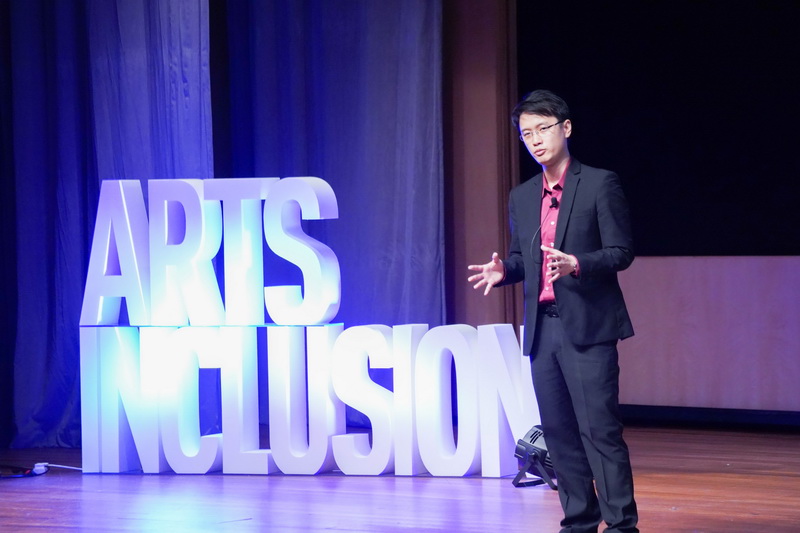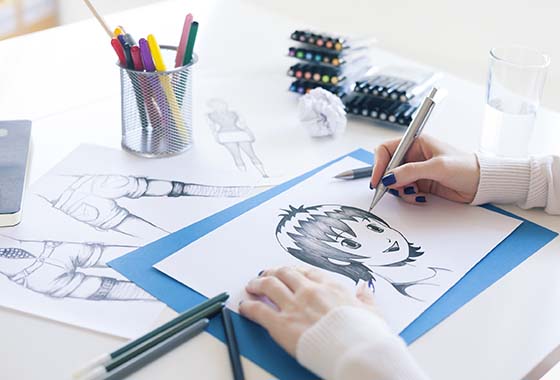OHKF Urges Government to Promote Arts Participation as a Tool to Forge More Inclusive Communities
(28 March 2018, Hong Kong) Our Hong Kong Foundation (OHKF) today launched a research report entitled Celebrating the Inclusive Power of Arts, recommending the utilisation of the Arts to nurture a healthy, vibrant and inclusive community through a concerted government effort, such as preventing people from being marginalised and enhancing the overall wellbeing of the community. The report also stresses that Hong Kong lags behind in the development of arts inclusion.
 |
| Stakeholders in arts therapy from Hong Kong and overseas share their thoughts on arts inclusion during the panel discussion. (From left to right): Mr. Stephen Wong, Deputy Executive Director and Head of Public Policy Institute, OHKF Prof. Rainbow Ho, Director of HKU’s Centre on Behavioral Health Mr. Gavin Glayton, Executive Director, Arts & Minds Mr. Bernard Chan, Chairman, The Hong Kong Council of Social Service Mr. Richard Ings, Senior Manager - Special Projects, Arts Council England Mr. Leong Cheung, Executive Director, Charities and Community, The Hong Kong Jockey Club Professor Lena Lee, Arts Specialist, Arts with the Disabled Association of Hong Kong |
Specific recommendations include: 1) an innovative concept of social prescribing that allows patients to better access arts therapy and other activities of creative engagement within the community; 2) mobilisation of arts therapists in the health and social welfare sectors to reinforce medical-social collaboration, creating a coherent structure of therapies for a wide range of beneficiaries; and 3) sustained funding mechanism for arts projects with demonstrable social impact.
From a socio-medical perspective, the report examines the potential benefits of arts participation for all people (regardless nationality, age, social status, physical appearance or mental condition) and the efficacy of “arts therapy” for patients as a form of treatment. The Arts is noted for alleviating the symptoms of mood disorders among vulnerable adolescents; arts intervention prevents students of different ages from developing high-risk behaviour and allows for treatment during the early stages.

“Participatory arts, in the form of indulging in a painting, acting in a theatre troupe, or being a part of a music ensemble for instance, are increasingly a means to expand the scope of people’s participation in a society, improve people’s access to cultural rights, connect individuals on a single, shared platform; on top of that, it is the means to expression and communication to the many who are communicatively-disadvantaged, enabling an avenue for their voices and needs to be heard”, said Alvin Cheung, Senior Researcher, OHKF.
According to the report, arts participation and creative engagement are particularly beneficial among the elderly (including those with dementia), ex-offenders, at-risk youths, ethnic minorities, and the disabled (including those with attention deficit/hyperactivity disorder (AD/HD), autism spectrum disorder (ASD), and specific learning difficulties (SpLD)). Through interviews with 132 local stakeholders, including focus local beneficiaries from all walks of life, OHKF’s research team has identified the benefits in six categories: 1) personal development; 2) social cohesion; 3) community empowerment and self-determination; 4) local image and identity; 5) imagination and vision; and 6) health and wellbeing.
OHKF suggests that arts therapists should become “Allied Health Professionals” of the Hospital Authority because the current services for people with AD/HD, ASD, ID and SpLD may not be adequate due to their communicative and cognitive difficulties. OHKF also suggests that arts therapy should be used for students with special educational needs (SEN). The Hong Kong Rehabilitation Programme Plan and the Establishment of Commission on Children are where the government can take the above recommendations into account. Likewise, a more sustainable funding mechanism supporting research may be considered in the upcoming Arts Development Fund for Persons with Disabilities.
“Arts inclusion is particularly pertinent to Hong Kong because of a rapidly ageing population and the growing needs of different demographics. It is a form of social innovation and a viable option to render social and therapeutic benefits and to empower those who may fall behind in our society”, said Stephen Wong, Deputy Executive Director and Head of Public Policy Institute, OHKF.

The report was launched today at the “Arts Inclusion” summit officiated by Ms. Eva Cheng, Executive Director of Our Hong Kong Foundation, Mr. Bernard Chan, Chairman, The Hong Kong Council of Social Service, Mrs. Gwen Kao, Chairman of Charles K. Kao Foundation for Alzheimer’s Disease, Ms. Susannah Morley, Director of Partnerships and Programmes of British Council, Ms. Adeline Ooi, Director Asia of Art Basel, Mrs Olivia Leung, Vice Chairperson and Chair of Marketing & Fundraising Committee of ADAHK, and Mr. Jay Xu, Director and Chief Executive Officer of Asian Art Museum.
Panelists included Professor Rainbow Ho, Director of HKU’s Centre on Behavioral Health; Mr. Leong Cheung, Executive Director, Charities and Community, The Hong Kong Jockey Club; Professor Lena Lee, Arts Specialist, Arts with the Disabled Association of Hong Kong; Mr. Gavin Glayton, Executive Director, Arts & Minds; and Mr. Richard Ings, Senior Manager - Special Projects, Arts Council England.

Antony J. Chan, Head of Arts and Creative Industries, British Council (co-organiser of the summit) said, “The Arts have the power to transform our thinking and connect people from all walks of life and countries of origin, regardless of their age, background, gender, sexual orientation, ability or social status. It is therefore essential that the Arts should be accessible to all, not just the few. With this in mind, we welcome this pioneering research by Our Hong Kong Foundation, and we support their call for the implementation of more inclusive public policies towards the Arts in Hong Kong that work to ensure that creative activity can be a part of everyone’s lives.”



